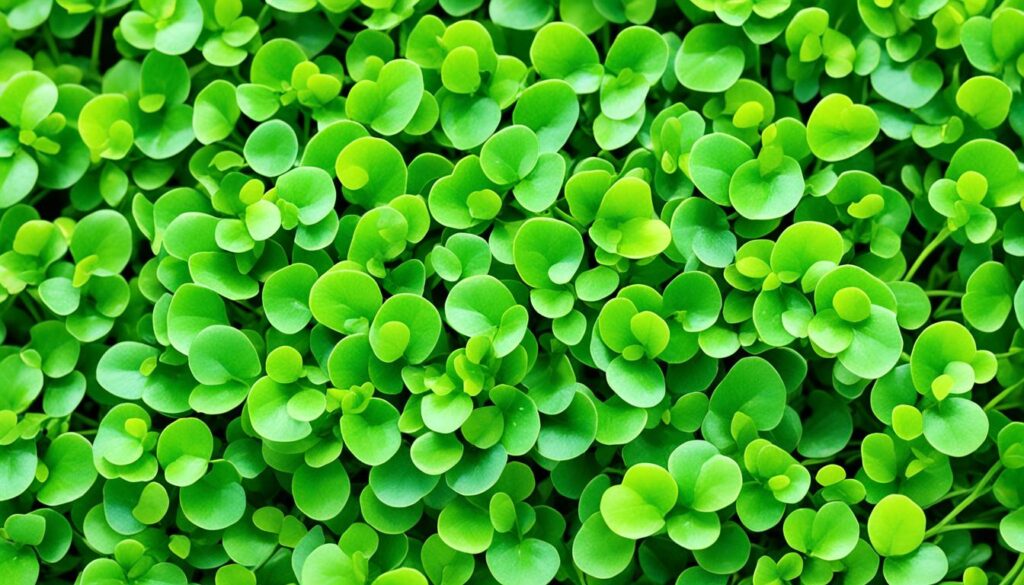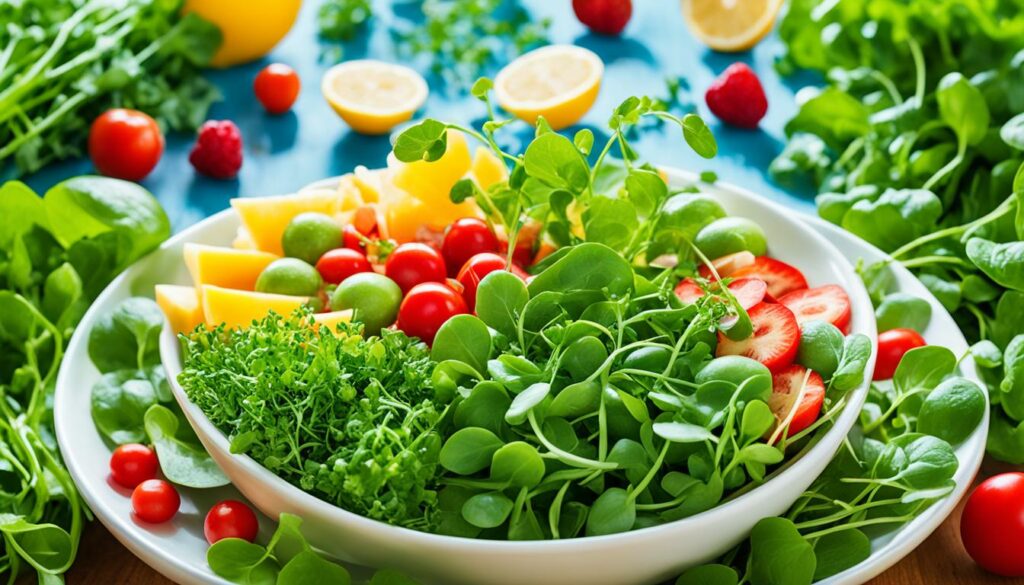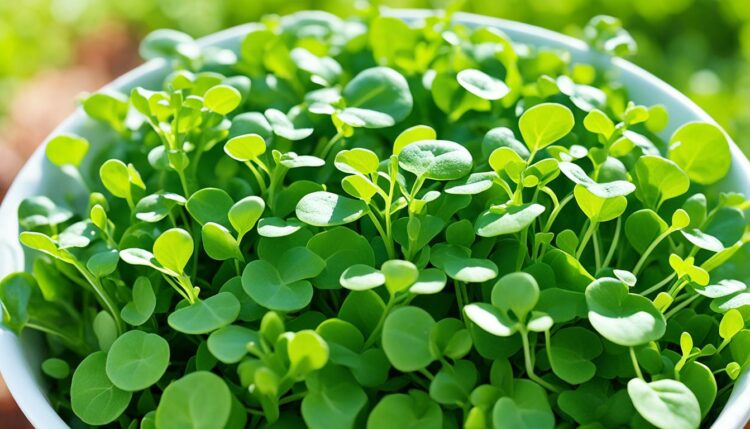Watercress, a leafy green vegetable belonging to the Brassicaceae family, is a nutritional powerhouse that offers a range of health advantages. Whether enjoyed raw in salads or incorporated into various dishes, watercress is a flavorful and nutritious addition to any diet.
One of the significant benefits of eating watercress is its nutrient density. Despite being low in calories, watercress is packed with essential vitamins and minerals, particularly vitamin K. This green leafy vegetable is also rich in antioxidants, which can help lower the risk of chronic diseases.
Key Takeaways:
- Watercress is low in calories but high in vitamins and minerals, particularly vitamin K.
- It is a rich source of antioxidants, which may lower the risk of chronic diseases.
- Watercress contains compounds that have been shown to prevent certain types of cancer.
- Eating watercress can be beneficial for heart health by lowering blood pressure and reducing the risk of heart disease.
- It is also beneficial for bone health and may help prevent osteoporosis.
Nutritional Value of Watercress
Watercress is a highly nutrient-dense food that provides a wide range of vitamins and minerals. It is ranked number one on the list of Powerhouse Fruits and Vegetables by the US Centers for Disease Control.
One cup of watercress contains only 4 calories and is rich in vitamin A, vitamin C, and vitamin K. It also provides small amounts of vitamin E, thiamine, riboflavin, vitamin B6, folate, pantothenic acid, magnesium, phosphorus, potassium, sodium, and copper.
The high nutrient density of watercress makes it an excellent choice for a healthy diet.
Watercress Nutritional Profile
Here is a breakdown of the vitamins and minerals found in one cup (34 grams) of watercress:
| Nutrient | Amount per Cup (34g) |
|---|---|
| Vitamin A | 106% of the Daily Value (DV) |
| Vitamin C | 24% of the DV |
| Vitamin K | 85% of the DV |
| Vitamin E | 3% of the DV |
| Thiamine (Vitamin B1) | 3% of the DV |
| Riboflavin (Vitamin B2) | 4% of the DV |
| Vitamin B6 | 3% of the DV |
| Folate | 4% of the DV |
| Pantothenic Acid (Vitamin B5) | 2% of the DV |
| Magnesium | 2% of the DV |
| Phosphorus | 1% of the DV |
| Potassium | 3% of the DV |
| Sodium | 1% of the DV |
| Copper | 2% of the DV |
With its abundance of vitamins and minerals, watercress is a nutritional powerhouse that can contribute to overall health and well-being.
Antioxidant Content and Chronic Disease Prevention
Watercress is a powerhouse of antioxidants, providing protection against cell damage caused by free radicals. These antioxidants play a crucial role in lowering the risk of chronic diseases, including diabetes, cancer, and heart disease.
The antioxidant profile of watercress is truly impressive, with over 40 unique flavonoids that make it one of the most antioxidant-rich vegetables available. Studies have shown a strong link between the antioxidants present in watercress and a reduced risk of various types of cancer, diabetes, and heart disease.
The isothiocyanates found in watercress have also demonstrated potent cancer-fighting properties, offering protection against colon, lung, prostate, and skin cancers. Regular consumption of watercress can be an effective strategy in preventing the onset of these life-threatening diseases.

Quotes:
“The antioxidants in watercress provide a powerful defense against the development of chronic diseases, including cancer, diabetes, and heart disease.” – Dr. Sarah Thompson, Nutritionist
“Watercress is a valuable addition to a healthy diet, as its antioxidants can help prevent cell damage and reduce the risk of chronic diseases.” – Dr. James Collins, Medical Researcher
Astounding Antioxidant Richness of Watercress
| Antioxidant | Antioxidant Activity |
|---|---|
| Flavonoids | Powerful scavengers of free radicals |
| Isothiocyanates | Cancer-fighting properties |
| beta carotene | Protects against oxidative stress |
Heart Health Benefits
Eating watercress can have a positive impact on heart health. As a member of the cruciferous vegetable family, watercress has been associated with a reduced risk of heart disease.
The antioxidants found in watercress, such as beta carotene, zeaxanthin, and lutein, play a crucial role in promoting heart health. These antioxidants help lower blood pressure and reduce the risk of heart disease, heart attacks, and strokes.
Furthermore, watercress contains dietary nitrates, which are known to improve blood vessel health and lower blood pressure. By consuming watercress regularly, individuals may experience improved heart function and a reduced risk of cardiovascular complications.
In addition to its antioxidant and nitrate content, watercress may also help lower cholesterol levels. High levels of bad cholesterol (LDL) can contribute to heart disease, while higher levels of good cholesterol (HDL) can lower the risk.
Studies have shown that watercress consumption may lead to a decrease in LDL cholesterol levels, further supporting heart health.
Research on Watercress and Heart Health
“A study published in the Journal of Nutrition and Metabolism found that participants who consumed watercress experienced a decrease in systolic blood pressure and an improvement in vascular function.
Another study published in Nutrition Research involving individuals with mild hypertension showed that daily watercress consumption led to a significant reduction in both systolic and diastolic blood pressure.”
Heart Health Benefits of Watercress
| Heart Health Benefits | Explanation |
|---|---|
| Lowers blood pressure | The antioxidants and dietary nitrates in watercress can help lower blood pressure, reducing the risk of hypertension and related cardiovascular conditions. |
| Reduces risk of heart disease | The antioxidants in watercress protect against cardiovascular damage and reduce the risk of heart disease, heart attacks, and strokes. |
| Improves vascular function | Consuming watercress can improve the health and function of blood vessels, leading to better overall cardiovascular function. |
| Lowers cholesterol levels | Regular watercress consumption may help reduce LDL cholesterol levels, lowering the risk of heart disease. |
Bone Health and Osteoporosis Prevention
Watercress is an excellent choice for promoting bone health and preventing osteoporosis. It is packed with essential nutrients that contribute to maintaining strong and healthy bones.
Firstly, watercress contains calcium, a vital mineral for bone health. Calcium is essential for the development and maintenance of bones and teeth. Consuming watercress regularly can help ensure an adequate intake of calcium, reducing the risk of bone-related issues.
In addition to calcium, watercress is rich in other minerals that support bone health, including magnesium, potassium, and phosphorus. These minerals play important roles in bone formation, strength, and density.
Furthermore, watercress is abundant in vitamin K, a nutrient crucial for bone health. Vitamin K supports the production of osteocalcin, a protein that regulates bone turnover and helps maintain bone strength. Research has shown that individuals with a high intake of vitamin K have a lower risk of hip fractures.
Include watercress in your diet to ensure a good supply of calcium, as well as other bone-supporting minerals like magnesium, potassium, phosphorus, and vitamin K. By consuming watercress and other nutrient-dense vegetables, you can contribute to overall bone health and reduce the risk of complications from osteoporosis.
| Nutrient | Amount per 100g |
|---|---|
| Calcium | 120mg |
| Magnesium | 21mg |
| Potassium | 330mg |
| Phosphorus | 60mg |
| Vitamin K | 250µg |
Immune Function and Infection Prevention
Watercress is a powerhouse when it comes to supporting immune function and preventing infections. One of its key nutrients, vitamin C, plays a vital role in bolstering the immune system.
Vitamin C stimulates the production of white blood cells, which are responsible for fighting off infections and protecting the body against harmful pathogens.
While vitamin C doesn’t guarantee complete prevention of the common cold or other infections, research suggests that it can help reduce the duration and severity of symptoms. By including watercress in your diet, you can naturally increase your vitamin C intake and give your immune system a boost.
Watercress’s immune-boosting properties can be attributed to its remarkable nutritional profile. Along with vitamin C, watercress contains a range of vitamins, minerals, and antioxidants that contribute to overall immune health.
“By including watercress in your diet, you can naturally increase your vitamin C intake and give your immune system a boost.”
It’s worth noting that watercress is not only a rich source of vitamin C but also a good source of other immune-supporting nutrients, including vitamin A and zinc. These nutrients work together to strengthen the immune system and help in the prevention of infections.
Watercress and Vitamin C
As mentioned, watercress is an excellent source of vitamin C, providing a significant amount of this immune-boosting nutrient. Vitamin C acts as an antioxidant, protecting cells from damage, and plays a crucial role in strengthening the immune system.
Research suggests that vitamin C may reduce the severity and duration of respiratory tract infections, such as the common cold. Its immune-enhancing properties make it an essential nutrient for maintaining optimal immune function and preventing infections.
Watercress and Infection Prevention
Watercress’s high concentration of immune-supporting nutrients, including vitamin C, makes it effective in preventing infections. By enhancing the immune response, watercress helps the body fight off pathogens and reduce the risk of becoming infected.
In addition to vitamin C, watercress contains various other antioxidants that play a role in infection prevention. Antioxidants help protect the body against oxidative stress and strengthen the immune system’s ability to combat infections.
Moreover, watercress’s anti-inflammatory properties may also contribute to infection prevention. Chronic inflammation can weaken the immune system and make the body more susceptible to infections. Incorporating watercress into your diet can help reduce inflammation, supporting overall immune function.
Overall, watercress is a valuable addition to a well-rounded diet and can help support immune function while reducing the risk of infections.

Weight Loss and Healthy Weight Management
While there haven’t been specific studies on watercress and weight loss, this highly nutritious vegetable can aid in weight management. Watercress is low in calories but provides essential nutrients, making it a filling and healthy addition to a weight loss diet.
Its high nutrient density allows you to consume larger quantities without consuming too many calories, helping you feel satisfied while supporting your weight loss goals.
Watercress is a versatile ingredient that can be incorporated into various dishes, such as salads, soups, and stir-fries. Its crisp texture and slightly peppery taste add flavor and freshness to meals, making it an enjoyable part of a weight loss journey.
In addition to being low in calories, watercress offers a range of health benefits that can contribute to weight management. Its high water content provides hydration, which is important for maintaining overall health and supporting weight loss efforts.
Watercress is also a good source of fiber, which can promote satiety and regulate digestion, helping you feel fuller for longer.
Furthermore, watercress is rich in vitamins and minerals, including vitamins A, C, and K, as well as calcium and iron. These nutrients support overall health and can contribute to a balanced diet, which is crucial for sustainable weight management.
“Watercress is a fantastic food for individuals looking to manage their weight. It’s both low in calories and highly nutrient-dense, making it a smart choice for those seeking to lose weight or maintain a healthy weight.”
When aiming for weight loss or healthy weight management, it’s important to focus on balanced meals and portion control.
While watercress is a beneficial ingredient, it should be part of a well-rounded diet that includes a variety of fruits, vegetables, lean proteins, and whole grains. Incorporating regular physical activity into your routine can also enhance weight loss efforts.
Watercress in a Healthy Weight Loss Plan: Sample Meal Ideas
Here are some meal ideas that incorporate watercress and align with a healthy weight loss plan:
- Watercress salad with grilled chicken breast and a lemon vinaigrette dressing
- Watercress and vegetable stir-fry with shrimp and brown rice
- Watercress and avocado smoothie with a sprinkle of chia seeds
- Watercress, tomato, and cucumber sandwich on whole grain bread
- Watercress and quinoa stuffed bell peppers
These meal ideas demonstrate how watercress can be incorporated into different dishes to provide flavor, nutrition, and support for weight loss goals.
Watercress Salad Recipe for Weight Loss
Try out this refreshing watercress salad for a nutritious and satisfying meal:
| Ingredients | Instructions |
|---|---|
|
|
This watercress salad is packed with fresh flavors and nutrients, making it a perfect choice for a light and healthy meal.
Conclusion
Watercress is a versatile and highly nutritious vegetable that offers a range of health benefits. It is not only low in calories but also packed with essential vitamins and minerals, making it an excellent choice for anyone looking to improve their overall well-being.
One of the standout benefits of watercress is its high antioxidant content, which can help protect against cell damage and lower the risk of chronic diseases such as diabetes, cancer, and heart disease.
Additionally, its anticancer properties, particularly in preventing colon, lung, prostate, and skin cancers, make watercress a valuable addition to a healthy diet.
Watercress’s positive effects on heart health, including lowering blood pressure and reducing the risk of heart disease, further highlight its importance. The vegetable’s role in supporting bone and eye health, boosting immune function, and aiding weight loss makes it a nutrient-dense choice for maintaining a healthy lifestyle.
Whether enjoyed raw in salads or cooked in various dishes, watercress can easily be incorporated into a balanced and nutritious eating plan. So, consider adding this leafy green to your diet and reap the numerous benefits it has to offer.
FAQ
What are the benefits of eating watercress?
Watercress offers a range of health benefits, including support for bone and eye health, enhancement of athletic performance, and immune system support. It is also beneficial for heart health, may protect against osteoporosis, and has shown potential in preventing certain types of cancer.
What is the nutritional value of watercress?
Watercress is highly nutrient-dense, containing vitamins A, C, and K. It also provides small amounts of vitamin E, thiamine, riboflavin, vitamin B6, folate, pantothenic acid, magnesium, phosphorus, potassium, sodium, and copper. With only 4 calories per cup, watercress is an excellent choice for a healthy diet.
How does watercress help prevent chronic diseases?
Watercress is packed with antioxidants, which can lower the risk of chronic diseases such as cancer, diabetes, and heart disease. Its unique flavonoid content and isothiocyanates have been linked to a lower risk of certain types of cancer.
What are the heart health benefits of watercress?
Watercress improves heart health by lowering blood pressure and reducing the risk of heart disease, heart attacks, and strokes. Its antioxidants, such as beta carotene, zeaxanthin, and lutein, support heart health. Additionally, watercress contains dietary nitrates that improve blood vessel health and may help lower cholesterol levels.
How does watercress support bone health?
Watercress contains calcium, magnesium, potassium, and phosphorus, all of which are important for maintaining healthy bones. Its high vitamin K content supports bone health by regulating bone turnover and reducing the risk of hip fractures.
How does watercress enhance immune function?
Watercress is rich in vitamin C, which boosts immune function and helps reduce the risk of infections. It promotes the production of white blood cells, which are vital for fighting off infections, and can contribute to a healthy immune system.
Can watercress aid in weight loss?
While there haven’t been specific studies on watercress and weight loss, it is a low-calorie vegetable that provides essential nutrients. Its high nutrient density makes it a filling and healthy addition to a weight loss diet, helping you feel satisfied while supporting your weight loss goals.
What are the overall benefits of including watercress in a healthy diet?
Watercress is a versatile and highly nutritious vegetable that offers numerous health benefits. From supporting bone and eye health to preventing chronic diseases and enhancing immune function, watercress is a valuable addition to a balanced and nutritious eating plan.




